人教版九年级英语Unit6知识点精讲及练习题
人教版九年级初三英语第六单元Unit6知识点+测试练习

Unit 6 When was it invented?一、句子背诵:①Someone stole my camera from my hotel room.②My camera was stolen from my hotel room.③My camera wasn’t stolen from my hotel room.④Was your camera stolen from your hotel room?⑤When was your camera stolen from your hotel room?二、知识点汇总:1. in style/ out of style2.please v. _______;_______→ pleasure n. ______________→pleased adj.(人)_______(It is ) a pleasure/ (It is ) my pleasure. 我的荣幸(是对方致谢时的答语;提供帮助后。
)--Can you help me carry the box?--With pleasure./ I would love to./No problem.--Thank you.--(It is ) a pleasure/ (It is )my pleasure.be pleased to do sth 愉快做某事be pleased with sth 对….满意It’s my _____________(please) to help you.他对这辆车很满意。
_____________________________.What pleased you best? _____________________________?3.Don’t mention it.(1)--I am sorry.-- Don’t mention it.(2)--Thank you.--Don’t mention it.4.by mistake----on purpose/ by design(反义词)5.nearly/ almost几乎,接近。
人教版英语九年级全册单元unit 6 知识点+测试卷+思维导图
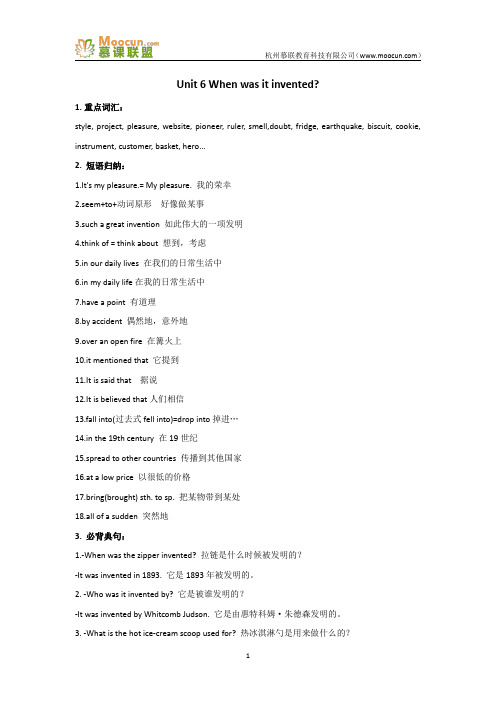
Unit 6 When was it invented?1.重点词汇:style, project, pleasure, website, pioneer, ruler, smell,doubt, fridge, earthquake, biscuit, cookie, instrument, customer, basket, hero...2. 短语归纳:1.It's my pleasure.= My pleasure. 我的荣幸2.seem+to+动词原形好像做某事3.such a great invention 如此伟大的一项发明4.think of = think about 想到,考虑5.in our daily lives 在我们的日常生活中6.in my daily life在我的日常生活中7.have a point 有道理8.by accident 偶然地,意外地9.over an open fire 在篝火上10.it mentioned that 它提到11.It is said that 据说12.It is believed that人们相信13.fall into(过去式fell into)=drop into掉进…14.in the 19th century 在19世纪15.spread to other countries 传播到其他国家16.at a low price 以很低的价格17.bring(brought) sth. to sp. 把某物带到某处18.all of a sudden 突然地3. 必背典句:1.-When was the zipper invented? 拉链是什么时候被发明的?-It was invented in 1893. 它是1893年被发明的。
2. -Who was it invented by? 它是被谁发明的?-It was invented by Whitcomb Judson. 它是由惠特科姆·朱德森发明的。
人教版九年级英语Unit6单词、课文知识梳理,词汇句式精讲

人教版九年级英语Unit6单词、课文知识梳理/词汇句式精讲01 Unit6 单词梳理heel [hi:l] n. 鞋跟;足跟scoop [sku:p] n. 勺;铲子electricity [iˌlekˈtrisəti] n. 电;电能style [stail] n. 样式;款式project ['prɒdʒekt] ['prɑ:dʒekt] n. 项目;工程pleasure [ˈpleʒə(r)] n. 高兴;愉快zipper [ˈzipə(r)] n. (= zip) 拉链;拉锁daily [ˈdeili] adj. 每日的;日常的have a point 有道理website [ˈwebsait] n. 网站pioneer [ˌpaɪə'nɪə] [ˌpaɪə'nɪr] n. 先锋;先驱list [list] v. 列表;列清单n.名单;清单mention [ˈmenʃn] v. 提到;说到accidental [ˌæksɪˈdentl] adj. 偶然的;意外的.by accident 偶然;意外地ruler [ˈru:lər] n. 统治者;支配者boil [bɔil] v. 煮沸;烧开remain [rɪˈmeɪn] v. 保持不变;剩余smell [smel] v.(smelt[]smelt,smelled[] smelled)发出……气味;闻到saint[seint] n. 圣人;圣徒national ['næʃnəl] adj. 民族的;国家的;trade[treɪd] n.贸易;交易;v.做买卖;从事贸易;take place 发生;出现popularity [pɒpjʊ'lærətɪ] n.受欢迎,普及,doubt [daut] n. 疑惑;疑问v. 怀疑without doubt 毫无疑问;的确 .fridge [fridʒ] n. 冰箱 .low [loʊ] adj. 低的;矮的somebody ['sʌmbədi] pron.某人n.重要人物translate [trænsˈleit] v. 翻译 .lock [lɔk][la:k] v. 锁上;锁住n.锁ring [rɪŋ] v.(rang,rung)发出钟声或铃声;打电话earthquake [ˈʒ:(r)θkweik] n. 地震 .udden [ˈsʌdən] adj. 突然(的).all of a sudden 突然;猛地.bell [bel] n.钟(声);铃(声)biscuit [ˈbiskit] n. 饼干 .cookie[ˈkuki] n. 曲奇饼干 .musical [ˈmju:zɪkl] adj. 音乐的;有音乐天赋的instrument [ˈinstrumənt] n. 器械;仪器;工具. crispy [ˈkrispi] adj. 脆的;酥脆的.salty [ˈsɔ:lti] adj. 咸的sour [ˈsauə(r)] adj. 酸的;有酸味的 .mistake 错误地;无意中customer [ˈkʌstəmə(r)] n. 顾客;客户 .the Olympics [əˈlimpiks] 奥林匹克运动会.Canadian [kəˈneidiən] adj. 加拿大的;加拿大人的n.加拿大人 .divide [diˈvaid] v. 分开;分散 .divide ...into 把……分开 .basket [ba:ski[] n. 篮;筐 .not only ...but also ...不但……而且……look up to 钦佩;仰慕hero [ˈhiərəu] n. 英雄;男主角Professional [prəˈfeʃənl] adj.职业的;专业的Berlin [bə:lin] 柏林(德国城市) .NBA (National Basketball Association) 国家篮球协会(美国职业篮球联赛) .CBA (China Basketball Association) 中国篮球协会(中国职业篮球联赛) . Roy n. 罗伊(男子名)Whitcomb [ˈwitkəm] Judson [ˈdʒʌdsən]惠特科姆•贾德森 .Ruby [ˈru:bi] 鲁比(人名)Thomas [ˈtɔməs] Watson [ˈwɔtsən] 托马斯•沃森George [dʒɔ:(r)dʒ] Crum [krʌm] 乔治•克拉姆James[dʒeimz] Naismith[ˈnaismiθ]詹姆斯•奈史密斯02 Unit6 知识梳理【重点短语】1.It's my pleasure.= My pleasure. 我的荣幸2.seem+to+动词原形好像做某事3.such a great invention 如此伟大的一项发明4.think of = think about 想到,考虑5.in our daily lives 在我们的日常生活中6.in my daily life在我的日常生活中7.have a point 有道理8.by accident 偶然地,意外地9.over an open fire 在篝火上10.It is said that 据说11.It is believed that人们相信12.fall into(过去式fell into)=drop into掉进…13.in the 19th century 在19世纪14.spread to other countries 传播到其他国家15.at a low price 以很低的价格16.bring(brought) sth. to sp.把某物带到某处17.all of a sudden 突然地18.less than少于,不到more than = over 超过19.without doubt 毫无疑问20.at that time 在那时21.advise sb (not) to do sth建议某人(不要)做某事22.start doing sth 开始做某事23.work on sth 致力于某事24.(be) similar to 与……相似25.the Olympics 奥运会26.by mistake 错误地,无意地27.make a mistake 犯错28.divide ...into…把…分成…29.in the end = at last = finally 最后30.at the same time 同时【重点句型】1.give sth. to sb.I gave a pen to him. 我给他一支笔。
新人教版九年级英语Unit6-Unit8单元知识重难点及练习

新版人教版九年级英语Unit6-Unit9Unit6 When was it invented ?一.短语归纳1.It's my pleasure.= My pleasure. 我的荣幸2.seem+to+动词原形好像做某事3.such a great invention 如此伟大的一项发明4.think of = think about 想到,考虑5.in our daily lives 在我们的日常生活中6.in my daily life在我的日常生活中7.have a point 有道理 8.by accident 偶然地,意外地9.over an open fire 在篝火上 10.it mentioned that 它提到11.It is said that 据说 12.It is believed that人们相信13.fall into(过去式fell into)=drop into掉进… 14.in the 19th century 在19世纪15.spread to other countries 传播到其他国家 16.at a low price 以很低的价格17.bring(brought) sth. to sp.把某物带到某处 18.all of a sudden 突然地19.less than少于,不到more than = over 超过20.without doubt 毫无疑问21.at that time 在那时 22.advise sb (not) to do sth建议某人(不要)做某事23.start doing sth 开始做某事 24.work on sth 致力于某事25.(be) similar to 与……相似 26.the Olympics 奥运会27.by mistake 错误地,无意地 28.make a mistake 犯错29.divide ...into…把…分成… 30.in the end = at last = finally 最后31.at the same time 同时 32.teach(taught) sb to do sth 教某人做某事e up with 想出 34.encourage sb. to do sth.鼓励某人做某事35.the purpose of ……的目的 36.stop sb from doing sth 阻止某人做某事37.look up to sb.钦佩某人 38.look up the word 查找单词39.work together 一起工作 40.I want to achieve my dream.我想实现梦41.My dream will come true.我的梦想会实现 42.work hard 努力工作43.on a hard floor 在坚硬的地板上 44.lead to导致 leader 领导,引路人45.Don't mention it.不客气,不用 46.translate...into....把…翻译成…47.be used for doing sth=be used to do sth 48.dream of doing sth 梦想做某事二.用法集萃1. be used to do 被用来做某事 be used as 被用作…be used by sb. 被某人使用2.help sb do sth.=help sb. to do sth. 帮助某人做某事3.make a decision to do sth.=decide to do sth.决定做某事4.make sb. + adj. 使某人怎么样make sb do sth使某人做某事be made to do sth 被使唤去做某5..in this way这样,用这种方式三语法全解1.some time 一段时间 sometimes 有时 some times几次 sometime 某个时候2.one of the world's favorite drinks世界最受欢迎的饮料之一.one of …之一,后面的名词用复数(一般要加S),动词用单数(一般要加S);favorite,最喜欢的,前面要用“谁的”. 3.thousand千hundred百million百万,当它们前面有数字的时候,它们本身不能加S,当它们后面有of的时候它们要加S,但前面的数字和后面的of不能同时存在4.not…until直到…才,I don‘t go to sleep until 11 every day.我每天直到11点才睡觉。
人教版九年级英语Unit6知识点精讲及练习题教学总结

新目标九年级Unit 61. heel _____________ 11. 风格____________ 21. 剩余__________2. scoop_____________ 12. 项目,工程_________ 22. 贸易__________3. electricity__________ 13. 愉快(n.)__________ 23. 疑问__________4. zipper _____________ 14. 每日的___________ 24. 冰箱__________5. accidental _________ 15. 网站_____________ 25. 翻译__________6. saint _____________ 16. 先锋____________ 26. 锁上__________7. crispy _____________ 17. 名单____________ 27. 地震__________8. salty ____________ 18. 提到_____________28. 饼干__________9. popularity __________ 19. 差不多__________ 29. 仪器__________10. professional _______ 20. 煮沸_____________ 30. 英雄__________二、重点短语1. have a point _________________ 6. 发生________________2. by accident __________________ 7. 毫无疑问_______________3. all of a sudden ________________ 8. 错误地________________4. divide into __________________ 9. 不但……而且……_____________5. look up to _______________ 10. 把……译成……_____________三、重点句子1.Did you know that tea, the most popular drink in the world after water, was invented by accident?2.It is said that a chinese ruler called shennong was the first to discover tea as a drink.3.One day, shennong was boiling drinking water over an open fire. Some leaves from a tea plant fell into the water and remained there for some time.4.It is believed that tea was brought to Korea and Japan during the 6th and 7th centuries.5.In England, tea didn’t appear until around 1660, but in less than 100 years, in had become the national drink.6.The tea trade from china to western countries took place in the 19th century. This helped to spread the popularity of tea and the tea plant to more places around the world.7.Even though many people now know about tea culture, the chinese are without doubt the ones who best understand the nature of tea.8.Basketball is a much-loved and active sport that is enjoyed by many for fun and exercise.9.When he was a college teacher, he was asked to think of a game that could be played in the winter.10He divided the men in his class into two teams and taught them to play his new game. Players on the same team must work together to get the ball in the other team’s basket. At the same time, they need to stop the competing team from getting the ball into their own basket.11.Today, the popularity of basketball has risen around the world, with many young people dreaming of becoming famous payers.12.Basketball has not only become a popular sport to play, but it has also become a popular sport to watch.13.The number of foreign players, including chinese players, in the NBA has increased. These stars encourage young people to work hard to achieve their dreams.四、 跟踪训练:1. ---When ______ the telephone _______(invent)?---I think it __________(invent) in 1876.2. ---What is the hot ice-cream scoop _______(use) for?---It ’s ______(use) for serving really cold ice-cream.3. It ____(据说) that a Chinese ruler called Shen Nong was the first to discover tea as a drink.(鼓励)young people _______(work) hard to achieve their dreams. was/were + 及物动词过去分词如:The zipper was invented in 1893.2.辨析pleasure, pleasant 和pleased(1) pleasure, 名词,意为“高兴,愉快”,常见用法:It ’s a pleasure. / My pleasure. / Withpleasure. 不用谢,别客气。
人教版九年级英语unit6短语和句型总结及练习

人教版九年级unit6短语、句型及练习(含答案)一、短语总结。
1、be invented in+地点/时间被发明于某时某地be invented by sb 由某人发明的2、shoes with adjustable heels 可调后跟的鞋3、change the style of sth 改变……的风格4、see in the dark 在黑暗中看路5、run on electricity 电动的6、operate on sb给某人动手术7、think of 想出,想到8、with pleasure 乐意效劳9、such+(a/an)+形容词+名词如此……10、think about (doing) sth. 考虑(做)某事11、be used for (doing) sth 被用来做某事be used by sb. 被谁使用be used as 被当作……使用be used to do sth 被用来做某事be/get used to (doing) sth. 习惯做某事used to do sth 过去常做某事12、by accident=by chance 意外地,偶然地13、by mistake 错误地make mistakes in sth 在某事上犯错mistake A for B 错把……当成……14、in the end=finally=at last最后,终于at the end of…在……末,尽头by the end of 在……末之前end up with 以……结束end up doing sht 结束做某事15、形容词/副词+enough 足够的……enough +名词足够的……16、seem to do sth 似乎要做某事seem like +名词似乎象……Seem that 从句似乎……17、for a long time 好长时间18、sprinkle A on B把……撒在……上19、not...until...直到……才20、at that time 在那时21、over=more than 多于22、according to根据23、It’s said that从句据说……24、some time 一些时间sometime 某时(将来)sometimes有时some times 几次25、boil drinking water烧开水26、over an open fire在户外篝火上in the open air在户外27、fall into 落入fall off 从……掉下来fall down跌倒fall over 摔倒fall in love with 爱上28、make tea 沏茶29、It’s believed that从句人们认为……30、decide to do决定作某事31、not...until... 直到……才……32、in this/that way这/那样33、take place (意料之中)发生34、the popularity of... ……的普及35、without doubt 毫无疑问36、throw sth away 把……扔掉throw sth to sb 把某物扔给某人37、in the1950s在二十世纪五十年代38、prefer ….to…..更喜欢39、at a low price 以低价40、steal...from...从……偷……41、translate...into...把……翻译成……42、notice sb do/doing注意某人做过/正在做43、all of a sudden 突然,猛地44、make sb./sth. +形容词使……怎么样45、change...into... 把……变成……46、in history 在历史上47、play indoors在室内玩48、stop...from... 阻止……做某事49、on the same team 在同一个对50、the safety of ...……的安全51、knock into sb撞到某人knock at/on the door敲门52、divide…into…把……划分成53、the aim of ………的目的54、try to do sth 尽力做某事try doing sth. 尝试做某事55、get ... into ...把……弄进……56、dream of/about 梦想做某事57、not only...but also... 不但……而且……(并列主语时,谓语的数由最近主语决定)58、the number of... ……的数量(做主语时,谓语用单数) a number of 许多……(做主语时,谓语用复数)59、look up to 钦佩,羡慕60、encourage sb to do sth 鼓励某人做某事二、重点句子总结。
人教版初中英语-九年级-unit6知识点+练习
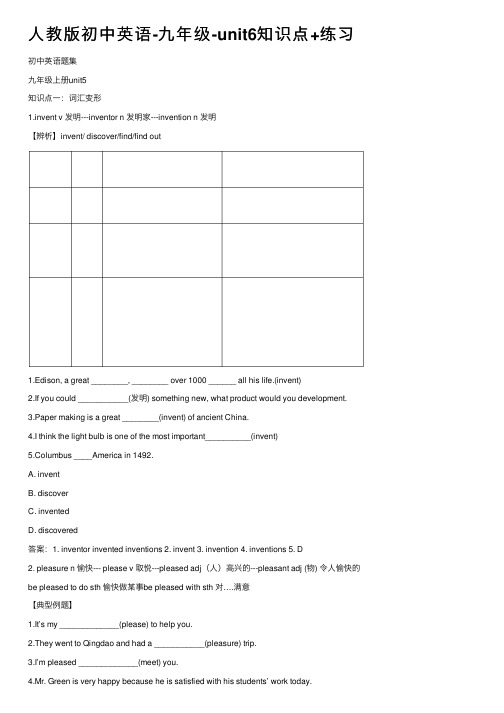
⼈教版初中英语-九年级-unit6知识点+练习初中英语题集九年级上册unit5知识点⼀:词汇变形1.invent v 发明---inventor n 发明家---invention n 发明【辨析】invent/ discover/find/find out1.Edison, a great ________, ________ over 1000 ______ all his life.(invent)2.If you could ___________(发明) something new, what product would you development.3.Paper making is a great ________(invent) of ancient China.4.I think the light bulb is one of the most important__________(invent)5.Columbus ____America in 1492.A. inventB. discoverC. inventedD. discovered答案:1. inventor invented inventions 2. invent 3. invention 4. inventions 5. D2. pleasure n 愉快--- please v 取悦---pleased adj(⼈)⾼兴的---pleasant adj (物) 令⼈愉快的be pleased to do sth 愉快做某事be pleased with sth 对….满意【典型例题】1.It’s my _____________(please) to help you.2.They went to Qingdao and had a ___________(pleasure) trip.3.I’m pleased _____________(meet) you.4.Mr. Green is very happy because he is satisfied with his students’ work today.A. is moved byB. is good forC. is fond ofD. is pleased with5. —Thank you for supporting the volunteer project.—________. Many hands make light work.A. My pleasureB. All rightC. Never mindD. That’s right 答案:1.pleasure 2. pleasant 3. to meet 4. D 5. A3. salty adj.咸的salt n “盐;⾷盐”→salty adj. 咸的【拓展】n +y = adj. Sun→ sunny cloud→ cloudy wind→ windy rain → rainy snow → snowy n+ ful = adj. u se →useful help→ helpful care → careful thankful感激的forgetful健忘的n + ly =adj. friend →friendly love→ lovely【典型例题】1.French fries taste_______(salt).2.I sprinkled lots of _______on them so they were really ______(salt)3.It's a____ day, isn't it? Let's do something special. (sun)4.She likes _______ cookies. They are hard dry and easily broken.A. saltyB. sweetC. sourD. crispy5.I want a sweet milk. Put some ______ in my cup, please.A. iceB. soupC. saltD. sugar答案:1.salty 2.salt , salty 3. sunny 4. D 5. D4. smell (1) n ⽓味a terrible smell 【记】small (⼩的) → smell(2) v → smelt →smelt +adj.闻起来smell terrible【典型例题】1.— How do you like the fish I cooked for you?—I haven’t had it yet. However, it ____ good.A. smellsB. tastesC. soundsD. feels2.Mum, what are you cooking? It ______ so sweet.A. tastesB. feelsC. soundsD. smells3.The bread smells _________ and it sells ________.A. well; goodB. good; goodC. good; wellD. well; well4.Mom is cooking dinner. It ______ so nice.A. smellsB. tastesC. feelsD. sounds答案:1.B 2.D 3. B 4. A5. accident n 事故--- adj accidental 意外的,偶然的by accident 偶然,意外地event & incident & accidentevent 通常指具有很⼤影响⼒的国内的、国际的或历史上的事件,也可以指运动会的⽐赛项⽬。
Unit6词汇精讲人教版英语九年级全册

九年级全一册英语同步复习 Unit 6 When was it invented?
1. 语法:一般过去式的被动语态;
2. 掌握单词表单词的汉意,拼写及相关词组;
3. 掌握并熟练运用重点单词的用法搭配;
英文 词性 中文 用法搭配 heel n. 鞋跟;足跟 scoop n. 勺;铲子
electricity
n.
电;电能
[助记]:
adj. 电的;用电的;电动的; electric
style n. 样式;款式 [词组]:
……的样式__________________________;
流行 :in style ; 过时:out of style ;
project n. 项目;工程
pleasure
un.
高兴;愉快
[词组]:
1. with pleasure! 乐意效劳!(表示乐于接受或同意某事);
2. My pleasure. (A pleasure ) 不客气。
(回答别人的感谢);
cn. 快乐的事 It’s a pleasure to meet you.
[助记]: pleased ______________ adj.
please (interj. /v.) pleasant______________
n. pleasure ______________
______________
[边学边练]
学习目标
夯基固本·厚积薄发 词 汇 学 习。
人教版九年级上册英语Unit 6 知识点过关及答案

人教版九年级上册英语Unit 6 知识点过关一.重点句子(15分)1.你知道茶是偶然间发明的吗?Do you know that tea ?2.据说一位叫神农的中国统治者最早发现了茶可以饮用。
that a Chinese ruler called Shen Nong wastea as a drink.3.人们认为,茶在六至七世纪传到了朝鲜和日本。
that teaKorea and Japan during the 6th and 7th centuries.4.孩子们不到十分钟就吃光了曲奇饼。
The cookies by the kids in10 minutes.5.拉链是什么时候发明的?was the zipper invented?6.它是由谁发明的?was it invented ?7.热冰激凌勺是用来做什么的?is the hot ice- cream scoop ?8.我们被分成四组做实验。
We' re four groups the experiment. 9.如今,许多年轻人都梦想成为著名的篮球运动员,篮球在世界各地也越来越普及。
Today, basketball has risen around the world, with many young people famous players.10.许多青少年仰慕这位著名的篮球运动员。
The famous basketball player by many teenagers.二、单元基础知识过关Ⅰ.单项选择(10分)( )1.— What should we buy for the picnic?— We'd better make a of things needed before going to the supermarket.A. listB. cardC. reportD. wish( )2. The potato chips have been in the paper bag for half an hour. They are not any more.A. crispyB. sweetC. saltyD. sour( )3. I could control my feelings at the moment. The movie reminds me of my childhood.A. reallyB. nearlyC. slowlyD. hardly( )4. The hot ice- cream scoop was invented a father and it is used scooping really cold ice- cream.A. with; forB. for; fromC. by; forD. by; from( )5. The government people to use public transport to go around because of the air pollution.A. encouragesB. warnsC. avoidsD. suggests( )6. It that the basketball was invented by James Naismith.A. believesB. believedC. is believingD. is believed( )7. Jenny found her keys when she cleaned her room.A. in personB. by accidentC. with pleasureD. without doubt( )8. My advice on how to save paper by my class last Monday.A. acceptsB. acceptedC. was acceptedD. is accepted( )9. Jane Peter is warm- hearted. They' re popular with our class.A. Both; andB. Not only; but alsoC. Neither; norD. Either; or( )10.—I had a good time in the study trip last week.A. With pleasureB. Thank youC. It's my pleasureD. I'm glad to hear thatⅡ.根据句意及首字母或汉语提示完成单词(15分)1. Her dress is out of s , so she wants to buy a new one.2. Would you please d the big apple into halves?3. It's too hot. You should put these foods in the f .4. This machine can t simple messages into 24 different languages.5. The meat is producing a terrible s . Throw it away.6. Peter became a manager, but Mike r a worker.7. Whenever I (提到) playing soccer, he always says he's too busy.8. Can you help me (烧开) some water?9. The young man is trying to be a (先锋) in the field of high technology.10. I’d like you to help me with the (项目) next week.Ⅲ.用括号中所给单词的适当形式填空(10分)1.I think you have put too much salt in the soup. It tastes quite ( salt).2. Please don't forget ( lock) your door when you go out.3. Music can offer ( please) to us, so many people like listening to it.4. Tea became the ( nation) drink of England in the 18th century.5. They were playing volleyball on the beach when it began to rain( sudden).6. The thief was seen ( enter) the mobile phone store.7. She didn't give up her dream of ( be) a dancer.8. As we know, ( Canada) speak English, too.9. The lady showed her ( music) talent at an early age.10. Knives are used for ( cut) things.Ⅳ.表达积累(10分)[主题:科技发明]阅读下面短文,在空白处填入一个适当的单词或括号内单词的正确形式。
人教版九年级全册英语Unit6 SectionA 知识讲解+专题练习学案(含答案)
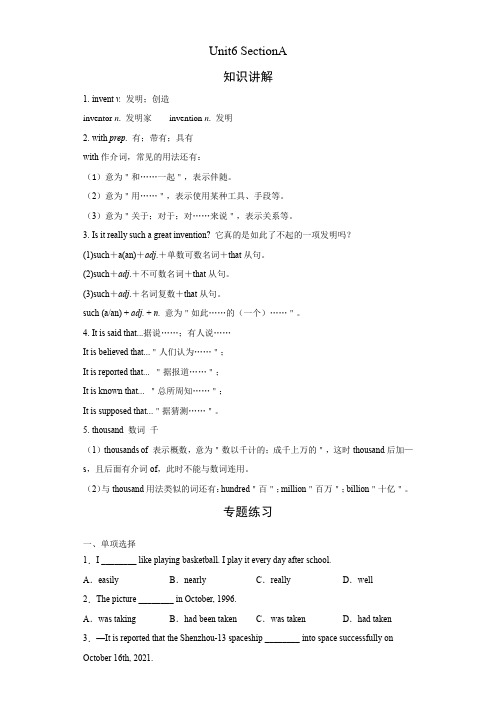
Unit6 SectionA知识讲解1. invent v.发明;创造inventor n. 发明家invention n. 发明2. with prep.有;带有;具有with作介词,常见的用法还有:(1)意为"和……一起",表示伴随。
(2)意为"用……",表示使用某种工具、手段等。
(3)意为"关于;对于;对……来说",表示关系等。
3. Is it really such a great invention? 它真的是如此了不起的一项发明吗?(1)such+a(an)+adj.+单数可数名词+that从句。
(2)such+adj.+不可数名词+that从句。
(3)such+adj.+名词复数+that从句。
such (a/an) + adj. + n. 意为"如此……的(一个)……"。
4. It is said that...据说……;有人说……It is believed that..."人们认为……";It is reported that... "据报道……";It is known that... "总所周知……";It is supposed that..."据猜测……"。
5. thousand 数词千(1)thousands of 表示概数,意为"数以千计的;成千上万的",这时thousand后加—s,且后面有介词of,此时不能与数词连用。
(2)与thousand用法类似的词还有:hundred"百";million"百万";billion"十亿"。
专题练习一、单项选择1.I ________ like playing basketball. I play it every day after school.A.easily B.nearly C.really D.well2.The picture ________ in October, 1996.A.was taking B.had been taken C.was taken D.had taken 3.—It is reported that the Shenzhou-13 spaceship ________ into space successfully on October 16th, 2021.— How proud we Chinese are!A.sent B.is sent C.was sent D.sends 4.Everyone is quite _______ to have a _______ trip.A.pleased; pleasant B.pleasing; pleasedC.pleasure; please D.pleasant; pleased5.They have bought more than 14,000 books since the library ________ last month. A.built B.will built C.was built二、完型填空It has been more than two thousand years since we began to use an umbrella on rainy days. However, people often felt not convenient to hold an umbrella while working. Then the rubber raincoat was invented by an Englishman named Macintosh in 1823.In 1492, Columbus, a well-known Italian voyager, 6 the New World—the American. He brought a lot of things to Europe from South America. Rubber was one of them, 7 people didn’t know its use at that time. In 1770, people found that the rubber could be used 8 erasers.Macintosh was a worker in an eraser factory in Scotland. One day he spilled(洒出)some rubber liquid(液体)over his clothes 9 when making erasers. He was too busy to clean it and went back home wearing the 10 clothes. On the way home, it rained heavily. Having no umbrella, Macintosh had to run home quickly. When he got home, he 11 the wet clothes. To his surprise, the area of the 12 with rubber wasn’t wet. “Why not make a rubber raincoat?” Macintosh thought. The next day he brushed the rubber liquid all over a coat. He wore the “rubber coat” on 13 days and took a walk in the field to test if it 14 really keep off the rain. 15 , the clothes inside the “rubber coat” weren’t wet at all. The rubber raincoat was created in this way by chance.The rubber raincoats soon appeared on the market. However, they were sticky in summer and hardened in winter. Year after year, people kept on improving the raincoats. Today raincoats are widely used in our daily lives.6.A.invented B.created C.described D.discovered 7.A.and B.but C.or D.if8.A.as B.to C.from D.by 9.A.slowly B.quickly C.carelessly D.carefully 10.A.new B.old C.clean D.dirty11.A.took off B.put on C.look out D.put off 12.A.body B.clothes C.house D.liquid 13.A.cloudy B.windy C.snowy D.rainy 14.A.might B.should C.could D.must 15.A.Especially B.Suddenly C.Surprisingly D.Normally三、阅读单选What is the most important invention of all time? Is it the written word that helps us to record information? Is it the telephone that lets us talk to people from all over the world? Is it the car that lets us travel at great speeds to meet others? Umberto Eco, an Italian writer, thinks it is something quite different. He says the most important invention might be bright in front of your eyes. He is talking about a simple pair of glasses.Modern eye glasses were invented around 1000 years ago. They were more than just a convenient way to read. Before glasses, writers, scientists or teachers who could not see properly had to memorize everything. After about ten years of poor eyesight, they could not remember well enough and could not work. Glasses meant that people could work in their old age.People who wanted to remember some information could write it down and read it. Eye glasses are one of the world’s greatest inventions and were probably worn by the people who designed the first telephones and cars.16.The invention of the written word is important because ____.A.we need it to listenB.we need it to record informationC.we just need it to read17.The author thinks ____ is the greatest invention of all time in his passage.A.the telephone B.the car C.a simple pair of glasses 18.From this passage, we can know ____.A.modern eye glasses were invented 100 years agoB.people who designed the first telephones and cars probably wore those glassesC.the author of this article is an American四、用所给单词的正确形式填空19.His body ______(find )in his wooden house this morning .20.A number of mail-in-ballots(邮寄选票) needed ________ (count) in several states during the US presidential election.21.It is said that the little boy _____(kidnap) last Sunday22.This book ________ (write) by Guo Jingming last month.23.The students didn’t understand the sentence until it ________ (explain) again.五、完成句子24.这个气球掉入水里,留在了那里。
初中英语 Unit6用法汇总+词法句法语法总结及练习人教版九年级全一册
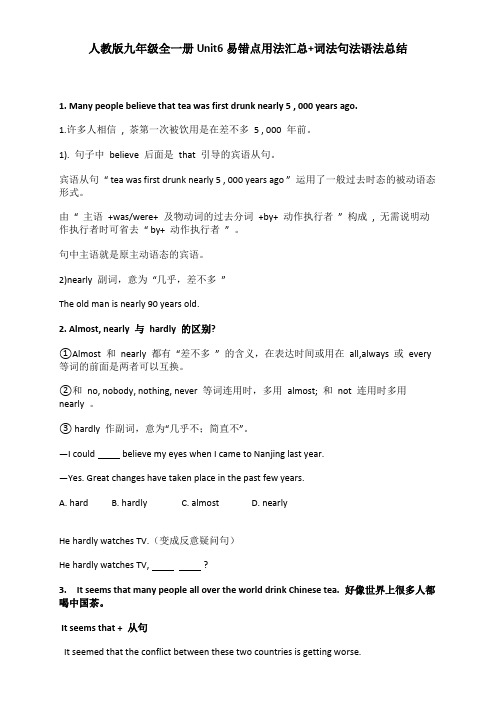
人教版九年级全一册Unit6易错点用法汇总+词法句法语法总结1. Many people believe that tea was first drunk nearly 5 , 000 years ago.1.许多人相信, 茶第一次被饮用是在差不多5 , 000 年前。
1). 句子中believe 后面是that 引导的宾语从句。
宾语从句“ tea was first drunk nearly 5 , 000 years ago ” 运用了一般过去时态的被动语态形式。
由“ 主语+was/were+ 及物动词的过去分词+by+ 动作执行者” 构成, 无需说明动作执行者时可省去“ by+ 动作执行者” 。
句中主语就是原主动语态的宾语。
2)nearly 副词,意为“几乎,差不多”The old man is nearly 90 years old.2. Almost, nearly 与hardly 的区别?①Almost 和nearly 都有“差不多” 的含义,在表达时间或用在all,always 或every 等词的前面是两者可以互换。
②和no, nobody, nothing, never 等词连用时,多用almost; 和not 连用时多用nearly 。
③ hardly 作副词,意为“几乎不;简直不”。
—I could believe my eyes when I came to Nanjing last year.—Yes. Great changes have taken place in the past few years.A. hardB. hardlyC. almostD. nearlyHe hardly watches TV.(变成反意疑问句)He hardly watches TV, ?3. It seems that many people all over the world drink Chinese tea. 好像世界上很多人都喝中国茶。
人教版九年级英语第六单元Unit 6 section A+B知识点精讲

人教版九年级英语第六单元Unit 6 section A+B知识点精讲Section A单词1. style /staɪl/ n.样式;款式典例I like this style. 我喜欢这个样式。
短语in style流行的;时髦的out of style过时的2. project /'prɒdʒekt/ n.项目;工程助记人生无须大project(工程),快乐才是subject(主题),体验才是object(目标)典例an international science project国际科学项目Project Hope希望工程联想subject.主题object.目标3.pleasure /'pleʒə (r)/ n.高兴;愉快助记please(v.使愉快)去e+-ure(名词后缀)= pleasure典例to read for pleasure读书以自娱短语with pleasure当然了/很愿意for pleasure为了消遣;为了娱乐联想pleased adj.高兴的;满意的pleasing adj.令人高兴的;令人满意的谚语Pain past is pleasure.苦尽甘来。
4. daily /'deɪli/ adj.每日的;日常的助记day(n.一天)变y为i+ly(形容词后缀)= daily典例There was little change in their daily lives. 他们的日常生活几乎没有变化。
近义everyday adj.每天的拓展daily还可作名词,意为“日报”。
注意-ly一般用作副词后缀,但是有些以-ly结尾的词是形容词。
常见的词如下:lovely可爱的weekly每周的monthly每月的yearly每年的friendly友好的lonely孤独的5. website /'websaɪt/ n.网站助记web(n.网)+site(n.地点;场所)= website典例There are many websites on the Internet now.现在因特网上有许多网站。
人教版九年级全册英语Unit6 SectionB 知识讲解+专题练习学案(含答案)
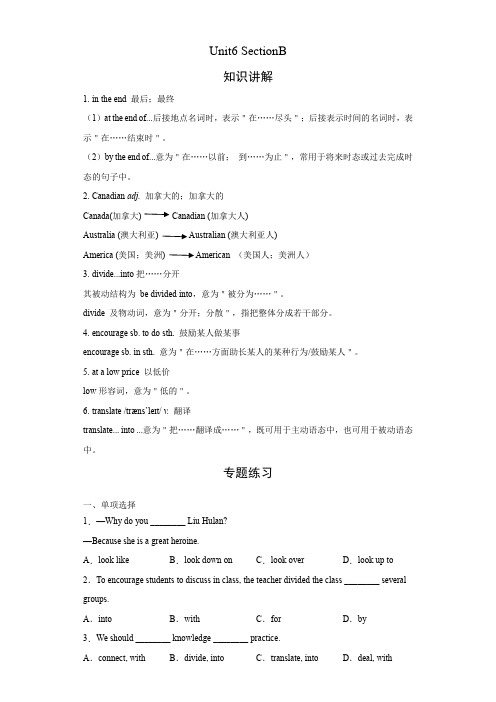
Unit6 SectionB知识讲解1. in the end 最后;最终(1)at the end of...后接地点名词时,表示"在……尽头";后接表示时间的名词时,表示"在……结束时"。
(2)by the end of...意为"在……以前;到……为止",常用于将来时态或过去完成时态的句子中。
2. Canadian adj.加拿大的;加拿大的Canada(加拿大) Canadian (加拿大人)Australia (澳大利亚) Australian (澳大利亚人)America (美国;美洲) American (美国人;美洲人)3. divide...into把……分开其被动结构为be divided into,意为"被分为……"。
divide 及物动词,意为"分开;分散",指把整体分成若干部分。
4. encourage sb. to do sth. 鼓励某人做某事encourage sb. in sth. 意为"在……方面助长某人的某种行为/鼓励某人"。
5. at a low price 以低价low形容词,意为"低的"。
6. translate /træns’leɪt/ v. 翻译translate... into ...意为"把……翻译成……",既可用于主动语态中,也可用于被动语态中。
专题练习一、单项选择1.—Why do you ________ Liu Hulan?—Because she is a great heroine.A.look like B.look down on C.look over D.look up to 2.To encourage students to discuss in class, the teacher divided the class ________ several groups.A.into B.with C.for D.by3.We should ________ knowledge ________ practice.A.connect, with B.divide, into C.translate, into D.deal, with4.Micheal Jackson is called King of Pop, and people all over the world _______ him. A.look straight at B.look up to C.look down upon 5.Many foreign students came to our school last week, including three________andfive________.A.Germen; Canadian B.Germans; CanadiansC.Germen; Canadians D.Germans; Canadian二、完型填空What do you need for an invention to be a success?To begin with, good timing is very 6 . You can have a good idea which the public doesn’t want yet. Take Giovanni Caselli as an example. He invented the first fax machine in the 1860s. Though the quality was excellent, his invention quickly 7 . The fax machine did not become a necessary piece of equipment in every office until the 1980s.Money also helps. The Frenchman Denis Papin had the idea for a steam engine almost a hundred years before James Watt was born. Denis never had enough money to 8 one.You also need to be patient. It took scientists nearly eighty years to invent a light bulb.9 , you shouldn’t be too slow. In the 1870s, Elisha Gray developed plans for a telephone. Gray saw it only as “a beautiful toy”. When he finally sent details of his invention to the Patent Office (专利局) on February 14th, 1876, it was too 10 . Almost the same designs had arrived just two hours earlier. The young man who sent them was Alexander Graham Bell. He is remembered as the inventor of the telephone.Of course what you really need is a wonderful idea. If you haven’t got one, a walk in the countryside and a careful look at 11 can help. The Swiss scientist, George deMestral, had the idea for V elcro (粘扣) when he found his clothes covered in sticky seed pods after a walk in the countryside.6.A.interesting B.important C.personal D.satisfying 7.A.died B.improved C.spread D.appeared 8.A.deliver B.repair C.use D.build 9.A.However B.Instead C.So far D.At last 10.A.modern B.difficult C.late D.old 11.A.society B.nature C.pictures D.advertisements三、阅读单选One of the main problems in cities is traffic congestion (堵塞). The main reason is that we are not expanding (扩展) our transportation systems fast enough to meet the ever-increasing demands (需求). One solution is to create a new type of transportation that doesn’t rely on (依赖) roads.In the last century, planes and cars changed the way we lived. Cars have allowed us to move farther. Planes have cut travel time to faraway places. At the beginning of a new century, we may see the realization of a century-old dream---the mix of cars and planes---the flying cars. You might have heard news about flying cars before. The technology to make them safe and easy to fly may finally be here. With progress in lightweight material, computer models and no-man control, the dream is very close to becoming real.Car maker Moller went public with the Skycar M400 in 2011. It is the first car that can take off and land straight. The four-seat-Skycar is powered by eight engines (引擎). The cost of the car is about $1million at first, but when it begins to be produced in large amounts, that price could come down to as low as $60,000.The latest flying car CityHawk is said to be tested between 2021 and 2022. It is similar to the Skycar except for its power source. The important difference lies in the power fans that seem much quieter on the road. The CityHawk is as large as a middle-sized car. It could be used as an air taxi for news collection and traffic control.The popularity of flying cars could be very exciting or very scary (令人害怕的),depending on how you see it. With proper rules, they could be the answer to our ever-heavier traffic pressure.12.According to the first paragraph, the new type of transportation should be used to_______.A.improve the speed of cars B.solve traffic congestion C.increase people’s demands D.replace the present transportation system13.The writer mentions two kinds of flying cars to ________.A.show the importance of flying cars B.explain how flying cars work C.encourage people to buy flying cars D.show flying cars are coming to us 14.What’s the difference between the Skycar and the CityHawk?A.The Skycar has fewer seats.B.The Skycar is more expensive.C.The CityHawk is much smaller.D.The CityHawk makes less noise.15.Which of the following shows the structure of the passage?A.B.C.D.16.We can infer from the text that the writer feels ________ about the future of flying cars. A.doubtful B.hopeful C.negative D.worried四、用所给单词的正确形式填空17.A true friend can help you get out of ________ (sad) when you’re unhappy.18.Our great leader Deng Xiaoping passed away in his ________ (90).19.Our school sports meeting was ________ (success) held two weeks ago.20.Make careful ________ (choose) before taking action, please.21.Don’t worry. I have made much ________ (进步) in learning English.五、完成句子22.今天上午他拿错了伞。
人教版九年级英语Unit6单词、课文知识梳理,词汇句式精讲
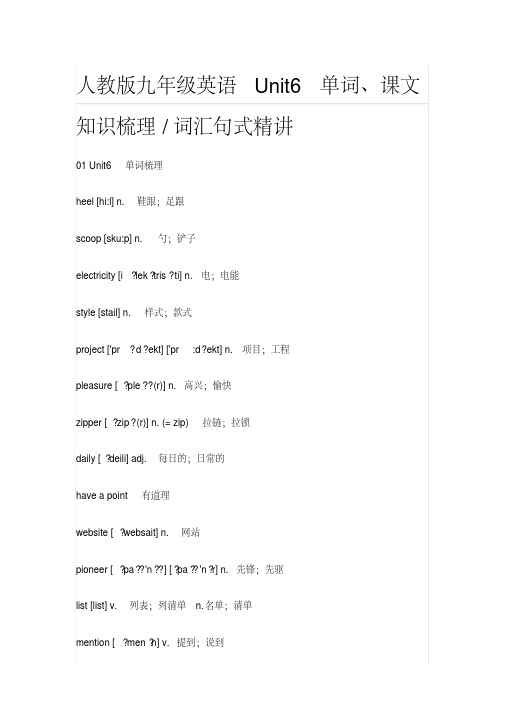
translate [tr?ns ?leit] v. 翻译 . lock [l ?k][la:k] v. 锁上;锁住 n.锁 ring [r ??] v. ( rang , rung )发出钟声或铃声;打电话 earthquake [ ??:(r) θkweik] n. 地震 . udden [ ?s?d ?n] adj. 突然(的) . all of a sudden 突然; 猛地 . bell [bel] n. 钟(声);铃(声) biscuit [ ?biskit] n. 饼干 . cookie[ ?kuki] n. 曲奇饼干 . musical [ ?mju:z ?kl] adj. 音乐的;有音乐天赋的 instrument [ ?instrum ? nt] n. 器械;仪器;工具 . crispy [ ?krispi] adj. 脆的;酥脆的 . salty [ ?s?:lti] adj. 咸的 sour [ ?sau ?(r)] adj. 酸的;有酸味的 . mistake 错误地;无意中 customer [ ?k ?st ?m ? (r)] n. 顾客;客户 .
人教版九年级英语 Unit6 单词、课文 知识梳理 / 词汇句式精讲
01 Unit6 单词梳理 heel [hi:l] n. 鞋跟;足跟 scoop [sku:p] n. 勺;铲子 electricity [i ?lek ?tris ?ti] n. 电;电能 style [stail] n. 样式;款式 project ['pr ? d ?ekt] ['pr ɑ:d ?ekt] n. 项目;工程 pleasure [ ?ple ??(r)] n. 高兴;愉快 zipper [ ?zip ?(r)] n. (= zip) 拉链;拉锁 daily [ ?deili] adj. 每日的;日常的 have a point 有道理 website [ ?websait] n. 网站 pioneer [ ?pa ??'n ??] [ ?pa ?? 'n ?r] n. 先锋;先驱 list [list] v. 列表;列清单 n. 名单;清单 mention [ ?men ?n] v. 提到;说到
人教版九年级英语Unit6知识点精讲及练习题

新目标九年级Unit 6课前检测重点单词雄 重点短语三、 重点句子I. Did you know that tea, the most popular drink in the world after water, was inven ted by accide nt? 2」t is said that a chin ese ruler called she nnong was the first to discover tea as a drink.3.0ne day, she nnong was boili ng drinking water over an ope n fire. Some leaves from a tea plant fell into the water and remained there for some time.4」t is believed that tea was brought to Korea and Japa n duri ng thJca nd 7th cen turies.5」n England, tea didn ' t appear until around 1660, but in less than 100 years, in had become the n ati onal drink.6. The tea trade from china to western countries took place in the 19h century. This helped to spread the popularity of tea and the tea pla nt to more places around the world.7. Eve n though many people now know about tea culture, the chi nese are without doubt the ones who best un dersta nd the n ature of tea.8. Basketball is a much-loved and active sport that is enjo yed by many for fun and exercise.9. Whe n he was a college teacher, he was asked to thi nk of a game that could be played in the winter. 10He divided the men in his class into two teams and taught them to play his new game. Players on the same team must work together to get the ball in the other team' same time, they need to stop the competing team from getting the ball into their own basket.II. Today, the popularity of basketball has risen around the world, with many young people dream ing of beco ming famous payers. 1. have a poi nt ________________2. by accide nt _________________3. all of a sudde n ______________4. divide into _________________ 6. 发生 __________________ 7. 毫无疑问 ________________ 8. 错误地 _________________ 9. 不但……而且…… ______________5. look up to ______________10.把……译成…… _______________ sbas12. Basketball has not only become a popular sport to play, but it has also become a popular sport to watch.13. The nu mber of foreig n players, in clud ing chin ese players, in the NBA has in creased. These stars en courage young people to work hard to achieve their dreams.四、跟踪训练:1. ---When _____ the telepho ne ______ (in ve nt)?---1 thi nk it _________ (in ve nt) in 1876.2. ---What is the hot ice-cream scoop ______ (use) for?---It ' _____ (use) for serving really cold ice-cream.3. It __ (据说)that a Chinese ruler called Shen Nong was the first to discover tea as a drink.4. These stars_ ______ (鼓励)young people _________ (work) hard to achieve their dreams.知识梳理1. 一般过去时被动语态,构成was/were +及物动词过去分词如:The zipper was inven ted in 1893.2. 辨析pleasure, pleasant和pleased(1) pleasure,名词,意为“高兴,愉快”,常见用法:It' s a pleasure. / My pleasure. / With pleasure.不用谢,别客气。
- 1、下载文档前请自行甄别文档内容的完整性,平台不提供额外的编辑、内容补充、找答案等附加服务。
- 2、"仅部分预览"的文档,不可在线预览部分如存在完整性等问题,可反馈申请退款(可完整预览的文档不适用该条件!)。
- 3、如文档侵犯您的权益,请联系客服反馈,我们会尽快为您处理(人工客服工作时间:9:00-18:30)。
新目标九年级Unit 61. heel _____________ 11. 风格____________ 21. 剩余__________2. scoop_____________ 12. 项目,工程_________ 22. 贸易__________3. electricity__________ 13. 愉快(n.)__________ 23. 疑问__________4. zipper _____________ 14. 每日的___________ 24. 冰箱__________5. accidental _________ 15. 网站_____________ 25. 翻译__________6. saint _____________ 16. 先锋____________ 26. 锁上__________7. crispy _____________ 17. 名单____________ 27. 地震__________8. salty ____________ 18. 提到_____________28. 饼干__________9. popularity __________ 19. 差不多__________ 29. 仪器__________10. professional _______ 20. 煮沸_____________ 30. 英雄__________二、重点短语1. have a point _________________ 6. 发生________________2. by accident __________________ 7. 毫无疑问_______________3. all of a sudden ________________ 8. 错误地________________4. divide into __________________ 9. 不但……而且……_____________5. look up to _______________ 10. 把……译成……_____________三、重点句子1.Did you know that tea, the most popular drink in the world after water, was invented by accident?2.It is said that a chinese ruler called shennong was the first to discover tea as a drink.3.One day, shennong was boiling drinking water over an open fire. Some leaves from a tea plant fell into the water and remained there for some time.4.It is believed that tea was brought to Korea and Japan during the 6th and 7th centuries.5.In England, tea didn’t appear until around 1660, but in less than 100 years, in had become the national drink.6.The tea trade from china to western countries took place in the 19th century. This helped to spread the popularity of tea and the tea plant to more places around the world.7.Even though many people now know about tea culture, the chinese are without doubt the ones who best understand the nature of tea.8.Basketball is a much-loved and active sport that is enjoyed by many for fun and exercise.9.When he was a college teacher, he was asked to think of a game that could be played in the winter.10He divided the men in his class into two teams and taught them to play his new game. Players on the same team must work together to get the ball in the other team’s basket. At the same time, they need to stop the competing team from getting the ball into their own basket.11.Today, the popularity of basketball has risen around the world, with many young people dreaming of becoming famous payers.12.Basketball has not only become a popular sport to play, but it has also become a popular sport to watch.13.The number of foreign players, including chinese players, in the NBA has increased. These stars encourage young people to work hard to achieve their dreams.四、 跟踪训练:1. ---When ______ the telephone _______(invent)?---I think it __________(invent) in 1876.2. ---What is the hot ice-cream scoop _______(use) for?---It ’s ______(use) for serving really cold ice-cream.3. It ____(据说) that a Chinese ruler called Shen Nong was the first to discover tea as a drink.(鼓励)young people _______(work) hard to achieve their dreams. was/were + 及物动词过去分词如:The zipper was invented in 1893.2.辨析pleasure, pleasant 和pleased(1) pleasure, 名词,意为“高兴,愉快”,常见用法:It ’s a pleasure. / My pleasure. / With pleasure. 不用谢,别客气。
(2) pleasant, 形容词,意为“令人愉快的,舒适的”,常用来修饰事物。
(3) pleased, 形容词,意为“感到高兴的,满意的”,主语为人,常用:be pleased with, be pleased to do sth.3. It is said that … 是一个常见句式,表示“据说……”, that 后是完整句子,it 作形式主语,真正的主语是that 引导的从句。
类似的句式还有:It is believed that…, It ’s reported that …, It ’s well-known that …等。
4. by mistake 意为“错误地,无意中”, mistake 要用单数,且无冠词。
by accident 意为“意外地”。
5. not only …but also 意为“不仅……而且……”当连接两个并列分句时,not only 可以放在句首表示强调,其后的分句要用部分倒装结构。
如Not only is she clever, but also she is beautiful. 当连接两个主语时,谓语动词的数应该和临近的主语保持一致,称为“就近原则”。
如:Not only Tom but also I am fond of watching TV .6. the number of 和 a number of 的区别:the number of 意为“……的数量”, 而a number of 表示“许多”。
例如:There are a number of students in our class, and the number of them is 45. 我们班有很多学生,其数目是45.7. stop … from doing sth. 阻止……做某事。
例如:They need to stop the competing team from getting the ball into their own basket.8. divide …into … 把……分成……,例如:Dr. Naismith divided the men in his class into two teams and taught them to play his new game.9. achieve one ’s dream 实现梦想,one ’s dream comes true 梦想实现。
例如:They are trying their best to achieve their dream. I think their dreams will come true one day.10. find it +adj. + that 从句,意为“发现某事是……”。
如:He found it interesting that so many products in the local shops were made in China. 另外,find it + adj. + to do sth. “发现。
